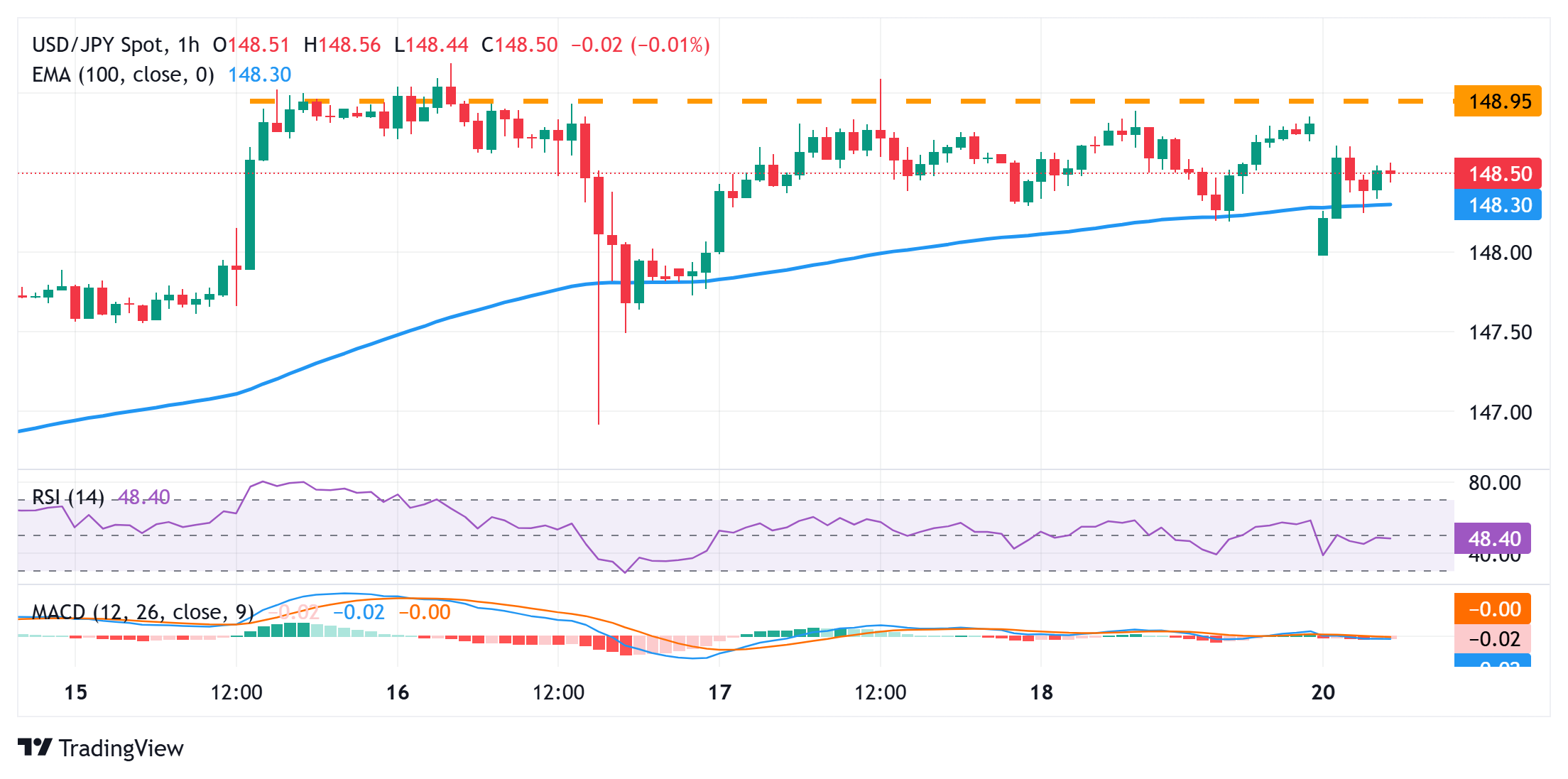Created
: 2025.07.21














![]() 2025.07.21 12:11
2025.07.21 12:11
The Japanese Yen (JPY) attracts fresh sellers following a modest bullish gap opening at the start of a new week amid the domestic political uncertainty. Japan's upper house election on Sunday dealt a big blow to the ruling coalition and raised concerns about an increase in debt, amid calls from the opposition to boost spending and cut taxes. The outcome could further complicate trade negotiations with the US amid the looming tariff deadline on August 1. Apart from this, the slowing economic growth, declining real wages, and signs of cooling inflation could allow the Bank of Japan (BoJ) to forgo raising interest rates in the near term, which, in turn, continues to undermine the JPY.
The aforementioned fundamental backdrop suggests that the JPY is more likely to continue with its relative underperformance witnessed since the beginning of this month. However, persistent uncertainties about US President Donald Trump's erratic trade policies could underpin the JPY's safe-haven status. Moreover, subdued US Dollar (USD) price action, amid mixed signals about the Federal Reserve's (Fed) rate-cut path, could act as a headwind for the USD/JPY pair and contribute to capping any further gains. Nevertheless, the fundamental backdrop seems tilted firmly in favor of the JPY bears and suggests that the path of least resistance for the pair is to the upside.

From a technical perspective, the USD/JPY pair once again showed some resilience below the 100-hour Exponential Moving Average (EMA). However, the recent failure to find acceptance above the 149.00 mark warrants some caution for bulls. Hence, it will be prudent to wait for some follow-through buying beyond the 149.15-149.20 region, or a multi-month peak, before positioning for any further gains. Given that oscillators on the daily chart are holding comfortably in positive territory, spot prices might then aim to reclaim the 150.00 psychological mark.
On the flip side, any corrective pullback might continue to find some support near the 148.00 mark, or the Asian session low. This is followed by the 147.70-147.65 area, or the 100-hour SMA, which, if broken, could drag the USD/JPY pair to sub-147.00 levels. Acceptance below the latter might shift the bias in favor of bearish trades and pave the way for a fall towards the 146.60 intermediate support en route to the 146.20 area, the 146.00 mark, and the 100-day SMA, currently pegged near the 145.80 region.
The Japanese Yen (JPY) is one of the world's most traded currencies. Its value is broadly determined by the performance of the Japanese economy, but more specifically by the Bank of Japan's policy, the differential between Japanese and US bond yields, or risk sentiment among traders, among other factors.
One of the Bank of Japan's mandates is currency control, so its moves are key for the Yen. The BoJ has directly intervened in currency markets sometimes, generally to lower the value of the Yen, although it refrains from doing it often due to political concerns of its main trading partners. The BoJ ultra-loose monetary policy between 2013 and 2024 caused the Yen to depreciate against its main currency peers due to an increasing policy divergence between the Bank of Japan and other main central banks. More recently, the gradually unwinding of this ultra-loose policy has given some support to the Yen.
Over the last decade, the BoJ's stance of sticking to ultra-loose monetary policy has led to a widening policy divergence with other central banks, particularly with the US Federal Reserve. This supported a widening of the differential between the 10-year US and Japanese bonds, which favored the US Dollar against the Japanese Yen. The BoJ decision in 2024 to gradually abandon the ultra-loose policy, coupled with interest-rate cuts in other major central banks, is narrowing this differential.
The Japanese Yen is often seen as a safe-haven investment. This means that in times of market stress, investors are more likely to put their money in the Japanese currency due to its supposed reliability and stability. Turbulent times are likely to strengthen the Yen's value against other currencies seen as more risky to invest in.
![]()
Created
: 2025.07.21
![]()
Last updated
: 2025.07.21

FXStreet is a forex information website, delivering market analysis and news articles 24/7.
It features a number of articles contributed by well-known analysts, in addition to the ones by its editorial team.
Founded in 2000 by Francesc Riverola, a Spanish economist, it has grown to become a world-renowned information website.
We hope you find this article useful. Any comments or suggestions will be greatly appreciated.
We are also looking for writers with extensive experience in forex and crypto to join us.
please contact us at [email protected].
Disclaimer:
All information and content provided on this website is provided for informational purposes only and is not intended to solicit any investment. Although all efforts are made in order to ensure that the information is correct, no guarantee is provided for the accuracy of any content on this website. Any decision made shall be the responsibility of the investor and Myforex does not take any responsibility whatsoever regarding the use of any information provided herein.
The content provided on this website belongs to Myforex and, where stated, the relevant licensors. All rights are reserved by Myforex and the relevant licensors, and no content of this website, whether in full or in part, shall be copied or displayed elsewhere without the explicit written permission of the relevant copyright holder. If you wish to use any part of the content provided on this website, please ensure that you contact Myforex.
Myforex uses cookies to improve the convenience and functionality of this website. This website may include cookies not only by us but also by third parties (advertisers, log analysts, etc.) for the purpose of tracking the activities of users. Cookie policy